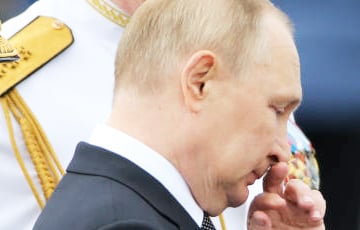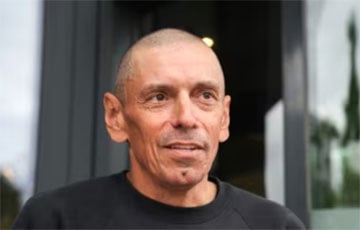Pavel Lakiychuk: Putin Is Facing A Deadlock
11- 11.06.2025, 19:02
- 22,716

There aren't a lot of options.
Many Western media outlets are writing that Russia is fighting at the limits - both economically and militarily. Experts claim that we are allegedly approaching some important line when Russia will need a break.
The website Charter97.org asked the head of military programs of the Center for Globalistics "Strategy XXI", captain of the Ukrainian Navy Pavel Lakiychuk to comment on this information:
- You know, when it comes to such broad generalizations, it is very difficult to give a clear answer - yes or no. Here you need to analyze the situation in its components, to consider the subject from different sides. After all, the subject has many aspects - social, political, economic and, of course, military parameters.
If we talk from the point of view of military factors, we can state that the Russian army has actually lost its Soviet reserve of strength. It may be able to maintain the intensity of combat operations at the same level for some time to come, but the nature of warfare is already changing, and with it the forces and means.
It is already said that a significant part of the Russian army's ammunition and weapons are of North Korean manufacture. That is, it turns out that the Russian army has first "eaten up" the Soviet stocks, and now it is actively "eating up" the North Korean stocks - the very ones that the DPRK has been accumulating for decades for a possible war with South Korea. At the same time, these stocks are also quite old.
But at the same time both countries - Russia and Ukraine - are moving to the production of new types of weapons - those that were not among the main ones even 10-20 years ago. Now the nature of warfare has changed, and so have the needs. It is extremely difficult to predict how things will develop further. But one trend can be traced: weapon systems are becoming easier and cheaper to produce. Ukraine has the potential to produce them, and Russia even more so.
What the nature of hostilities will be is the question. If we continue to act in the same way - with massive assaults with manpower - I think Russia will have enough resources for some time. This is if we talk about the short and medium term, about the balance between mobilization capabilities and personnel losses.
As a rule, to plan and conduct operations, you need both forces on the battlefield and certain resources. If this fork is covered - that is, losses are compensated, and resources are accumulated - it allows to continue combat operations. And if the ratio goes into the minus, it means that either the nature of hostilities will have to change, or they will simply begin to fade - there will not be enough forces to act as before.
Does Russia have reserves, human resources? Obviously, there are. If we look at the current format of mobilization in Russia, it is still going at the expense of recruitment. But as a reserve option, there is always full-fledged mobilization. Not to mention the possible social consequences, such a resource exists. Again, why Putin doesn't want to use it - he's afraid, he doesn't want to use it, he's not sure - it's hard to say.
But he is clearly trying to attract external resources, you can cite the fact that the North Korean military is involved, it was a good attempt. I'm not talking about casualties or the fact of their participation in hostilities - the important thing is the fact that Putin was able to convince Kim Jong-un to send a certain number of such troops. If it worked once, it can work the second time.
And, of course, there is also the Belarusian army. This is also a potential resource that Putin has been drooling over for years. Does he have an opportunity to actually use this resource? Yes, Lukashenko clings to his army - it is his only real support inside the country. But at the same time, this army is permeated with Russian agents.
At some point, without Lukashenko's will, his army may end up under the control of other structures. Is Putin ready to take such a radical step? Most likely, he is not ready yet, but there is such a resource, there is such a potential. Therefore, it is premature to say that Russia's human resource is being depleted.
The economic potential is also important. Here I cannot speak qualitatively, because it still requires analysis by professional economists - macroeconomic indicators, the ratio between the military and peaceful economy. I am not going to give an accurate assessment. But it seems to me that if you look at the whole situation in a comprehensive way, Putin is facing a peace stalemate.
- What does this mean?
- During the three years of war, he was able to restructure Russian society, to change its psychological mood, to reconfigure the economy and the state itself on military rails. This is a kind of drug, so returning to peacetime management methods will be a colossal stress for Russia, more than continuing the war. I think that's why Putin will be interested in the war continuing indefinitely.
He realizes that this is impossible, but he has no other choice. And even if it's not a war with Ukraine, this exhaust will have to be directed in some other direction. It's like in the old Soviet movie "Ivan Vasilyevich Changes Profession":
- Streltsy rebel!
- Send them to Tmutarakan.
- They already fought there.
- Then let's go to Kazan.
That's roughly the situation, not the happiest. But with a certain pressure on the front and external political pressure, if there is pressure from all sides, then perhaps this machine can simply break down. And then there will be changes inside, Russia will have no other choice.
- What are the main steps to be taken to make Russia run out of resources?
- Well, first of all, the sanctions that are imposed against Russia are good. But this is not the first country to be under sanctions. Dictatorial regimes and rogue states have long developed mechanisms to circumvent these restrictions. Starting with Iran and North Korea - Russia's own allies - a whole business has developed over the decades that makes money on external sanctions.
In essence, this is an informal agreement: we pretend to impose sanctions, and you pretend to comply with them. At the same time, schemes are created to circumvent them. Any sanctions only work if they are regularly monitored and loopholes are closed. This is the most complex and responsible element of sanctions policy.
Declaring sanctions is a demarche, a beautiful gesture. Everyone sees it, there is an international reaction, a certain moral image is formed in the countries that impose them. But to maintain the sanctions regime, to strengthen it, is a quiet, inconspicuous work. No one will praise them for it. But you can make good money on the fact that you do not adhere to them.











